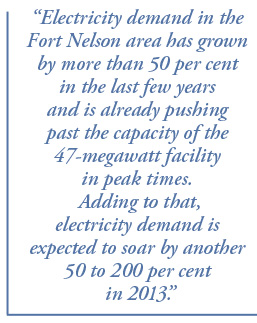
BC Hydro has narrowed the list of options to expand the Fort Nelson Generating Station to two, but a new plant or transmission line could still be built if electricity demand rises.
Electricity demand in the Fort Nelson area has grown by more than 50 per cent in the last few years and is already pushing past the capacity of the 47-megawatt facility in peak times.
Adding to that electricity demand is expected to soar by another 50 to 200 per cent in 2013 as oil and gas developments in the Horn River Basin start to come online and hook into the grid.
In order to cover the short-term needs, BC Hydro is asking the B.C. Utilities Commission to approve either a 24.7 MW upgrade of the natural gas facility that comes with a price tag of $140 million, or a smaller, 8.6 MW upgrade at a cost of about $90 million.
However even those upgrades won’t solve the problem, said BC Hydro community relations manager Bob Gammer.
“The larger option of the upgrade would only just basically meet the 50 per cent load increase if that forecast plays out,” he said.
Either upgrade would switch the plant from a simple cycle gas turbine to a combined cycle gas turbine, which would capture waste gas to produce more electricity and operate more efficiently, lowering the effluent and chemicals used.
Gammer pointed out BC Hydro also has the back-up supply from Alberta through transmission lines to Rainbow Lake, which BC Hydro is seeking to expand the capacity of.
BC Hydro is seeking a capacity increase of 10 MW from Alberta above and beyond an increase of four MW in 2007, however transmission upgrades expected to cost upwards of $6 million are needed to provide the service.
In the long-term, Gammer said the utility is still looking at either twinning the Fort Nelson Generating Station, with an identical facility directly next to the existing one, or building a $300 million transmission line to connect Fort Nelson to Fort St. John and the B.C. power grid.
“Those are definitely longer-term solutions based on the load-growth that we’ve seen in Fort Nelson in the last few years,” he said. "But we need to address that in more of the short term."
While Fort Nelson Mayor Bill Streeper said the community needs the power, he would prefer to see the smaller upgrade made and have BC Hydro connect Fort Nelson to the B.C. electrical grid.
“It is more economical and more environmentally friendly to produce that in one spot and send it down the transmission line than it is to have every one of us produce our own power,” he said.
He also pointed out the lodges on the highway could be electrified so they don’t have to run on diesel generators, which would allow them to operate more affordably in the winter, making the road safer.
“Think of the safety aspects of having a road of 250 miles from Fort St. John to Fort Nelson with nobody there,” he said.
Credit: Alaska Highway News